
Get Business Email
No domain name required
Looking for Enterprise Email?
Try Neo!
Emails are a means of communication, and enterprises cannot afford the risk of getting important client emails being buried under endless threads, missing deadlines because a message never syncs, and security scares that keep IT up all night.
These issues typically arise when enterprises rely on outdated on-premise email hosting or generic consumer-grade email software that lacks the scalability, security, and integration modern businesses need.
However, with an enterprise email service provider, everything from the infrastructure and security to updates and management is handled for you. You need to simply focus on using it.
As an enterprise, if productivity is suffering due to outdated systems, syncing issues, or security risks, it’s time to switch to a modern enterprise email service provider that ensures seamless communication, stronger protection, and effortless scalability. Let’s understand more about enterprise email service providers and the best picks for your business.
Top Enterprise Email Service Solutions at a Glance
Here are the top enterprise email solutions that could cater to your professional needs:
- Neo: best for small businesses seeking affordable plans, AI-powered features, strong security, and easy team collaboration.
- Titan and Proton Mail: Ideal for small and medium businesses prioritizing privacy, data encryption, and regulatory compliance.
- Google Workspace and Microsoft Outlook: Excellent for enterprises needing scalable, reliable, and fully integrated productivity tools.
- Zoho Mail: A great fit for businesses within the Zoho ecosystem looking for cost-effective email and online growth solutions.
Every enterprise is different, and so are its needs. So, we are not ranking the service providers; rather, we are highlighting the best options based on specific business goals, security requirements, and collaboration needs.
What is an Enterprise Email?
Enterprise email is a business-grade email service that is developed specifically for organizations that need secure, reliable, and scalable communication across teams and departments. An enterprise email provides more control and flexibility over the email resources as compared to a generic email.
Unlike free or generic email accounts, an enterprise email plan offers businesses:
- Custom domain, like yourname@companyname.co.site, for personal branding
- Advanced security features, like encryption, 2FA, advanced antispam, and antivirus
- Collaboration tools such as shared calendars, appointment booking, and contact directories
- Centralized administrative to manage all the email accounts associated with the domain name
- High availability and scalability, often backed by cloud-based infrastructure with 99.9% uptime guarantees
However, you can avail all these benefits if you choose the right email service provider. There are a multitude of options available. It becomes important to choose the right one such that you get all the features without spending extra on email management and marketing. So, let’s look at the best email service providers that you can consider as per your needs.
Compare top enterprise email providers
Top Enterprise Email Service Providers for 2025
Let’s discuss each enterprise email service provider in detail, including its features, steps to set up an email account, and pros and cons.
1. Google Workspace
Gmail, being a leader in email hosting services, needs no introduction. Creating your enterprise email account with Google means that you can seamlessly collaborate with the entire Google ecosystem, including powerful admin controls, advanced AI, email automation, and robust organizational features.
Features
- Create a custom domain enterprise email account. Further, you can create email access and group mailing lists.
- Advanced security features such as two-factor authentication and default encryption, a zero-trust approach, company-provided endpoints or BYOD.
- AI smart automation features such as smart reply, smart compose, automatic email filtering, auto-replies, and grammar suggestions.
- Custom email template, effortless search, integrations with Google Meet, Calendar, Chat, and Tasks.
- Comes with built-in AI assistant Gemini to boost your enterprise productivity.
How to set up Google Workspace Email?
Creating an enterprise email account on Google Workspace is a simple, step-by-step process. You can easily start a 14-day free trial to explore the platform and then make a purchase decision for the plan.
Step 1. Go to the Google Workspace website, and click on 'Start free Trial'.
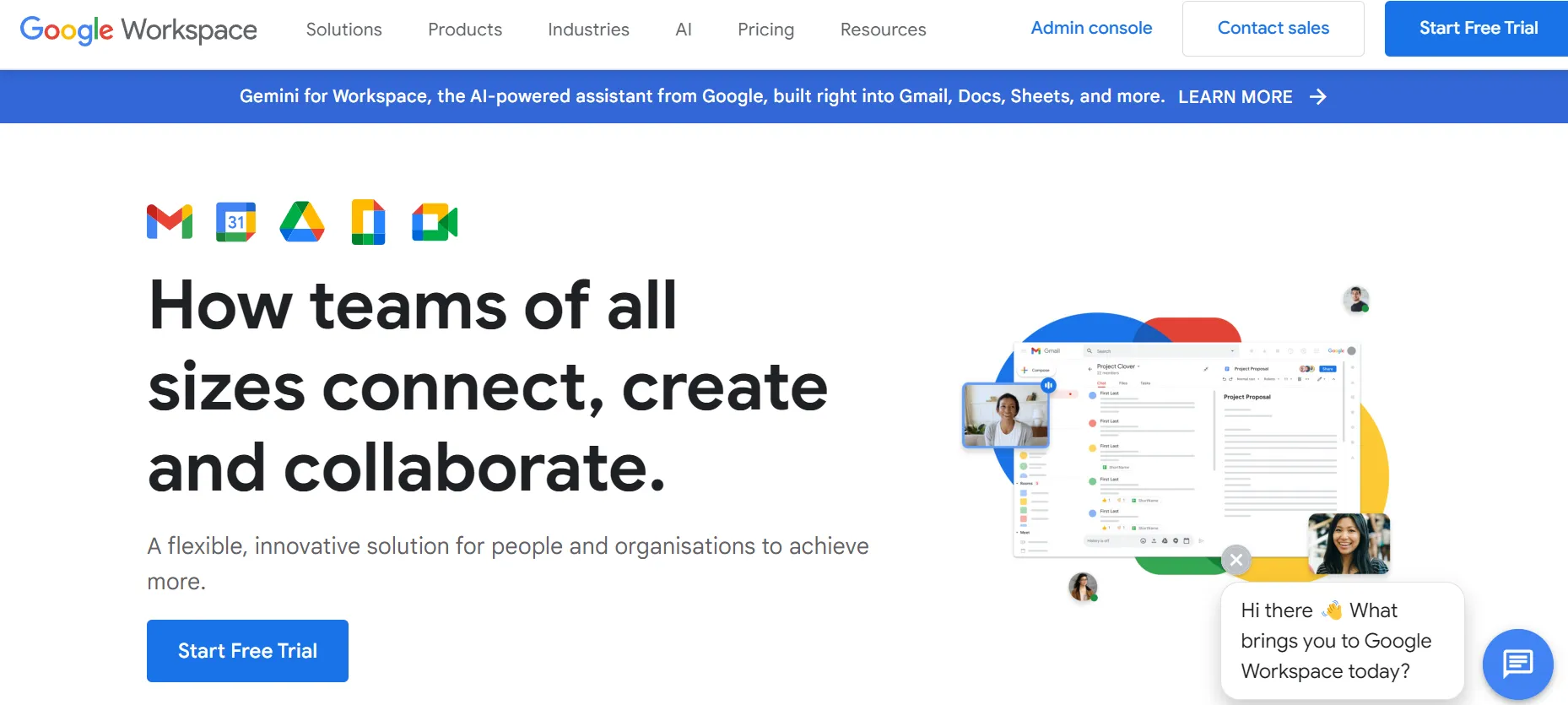
Step 2. Enter your small business information, including business name, number of employees, region and then click on ‘Next’.
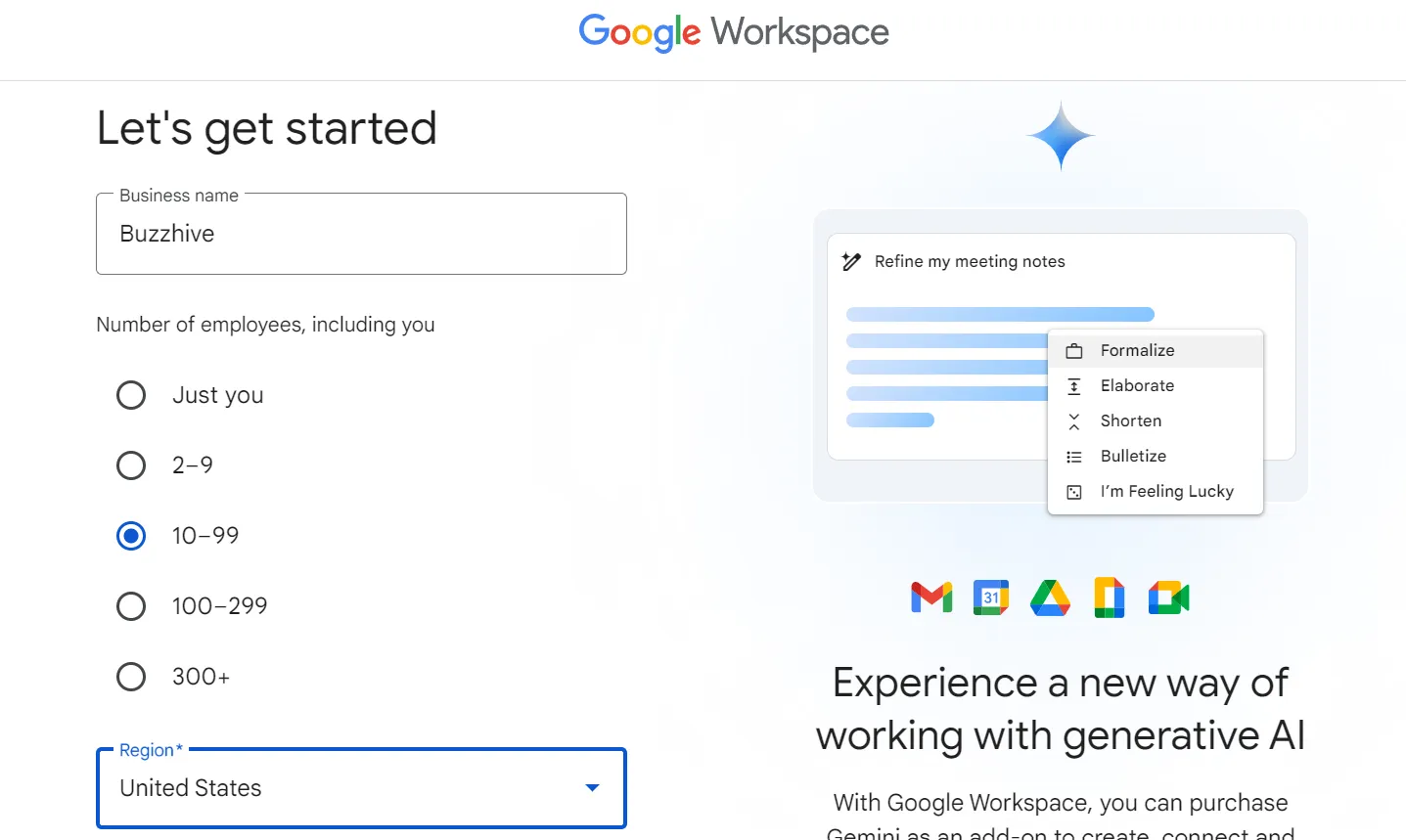
Step 3. Fill in your contact information, first name, surname, and email address, and then click ‘Next’.
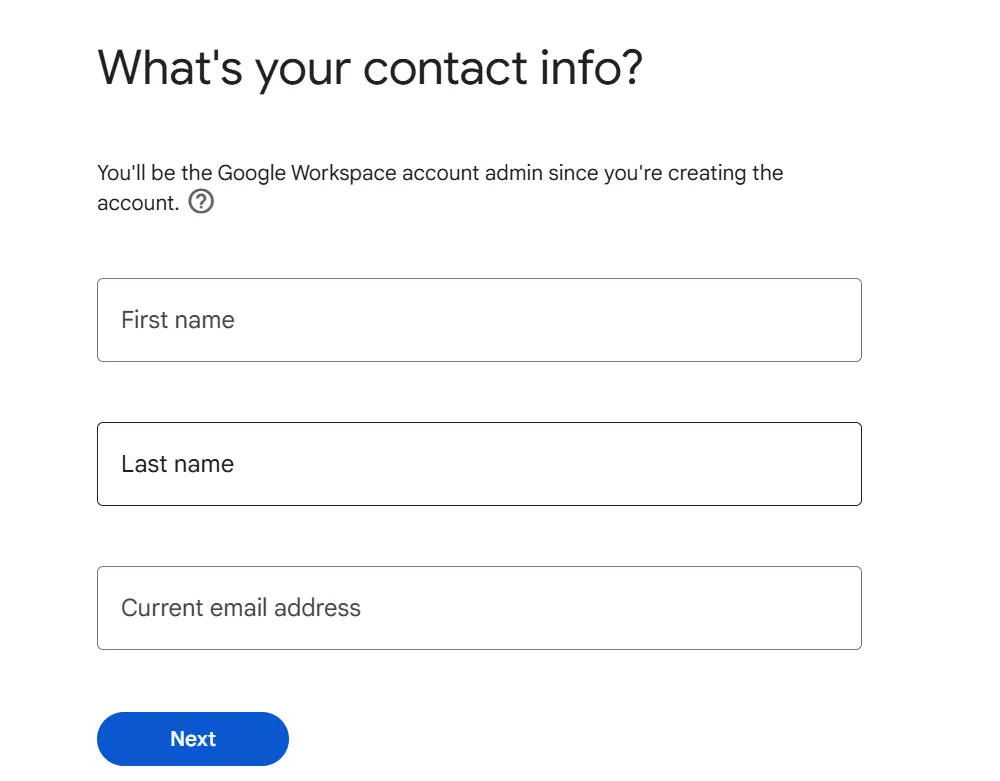
Step 4. Select the option, whether you want to use your existing or create a new one.
Step 5: If you select "Set up using your existing domain", you can put the existing domain name in and verify that you own it. Or you can select to create a new domain to enter the domain name you would like to purchase for your small business.
Step 6: After you have purchased your new domain name or verified your existing one, you can use it as a professional email address for your small business.
Step 7: Next, provide the necessary details to register the domain.
Step 8: Finally, you can create your enterprise email address and use this as a user name with a password to access your account.
Step 9: You can go in and add email addresses of your employees or aliases and activate your Gmail account.
Pros
- Offers a free trial and the convenience of using all Google tools in one place.
- It can block 99.9% attacks before they happen.
Cons
- If you don’t have a registered domain, you’ll have to purchase one. Google Workspace does not offer it for free.
- All cloud services, no offline capabilities.
2. Neo
Neo is among the cost-effective business email service providers that allows enterprise email address creation with a new free customized domain or your existing domain. That means, if you have an existing domain like (.com, .net, or .co.in, etc), you can verify and use it to create your enterprise email address. Alternatively, Neo offers a free (.co.site) domain, which is also recognized worldwide, and can be used to create customized email addresses for enterprises.
Features
- Create multiple customized email aliases for your enterprise email address.
- Business email capabilities include email tracking, priority inboxing, email rules, read receipts, email calendar, and bookings.
- Also offers AI-powered features, like creating a free one-page website or a complete AI website for your address. Other features include AI smart write for content creation, site analytics, lead generation, and customizable templates.
- Comes with a growth suite that is loaded with features like email campaigns, signature designer, and email templates.
- Advanced security features like two-factor authentication, data encryption, antivirus, and antispam. Allows email authentication with SPF, DKIM, and DMARC, therefore resulting in email deliverability even to cold emails.
How to set up Neo Email?
Follow these 5 easy steps to create a free email account for your enterprise with Neo:
Step 1: Go to the Neo site and click on the button Get started.

Step 2: In case you have a registered domain name, you can choose ‘Yes, I have a domain I can use’. Or, else you can choose ‘No, I need a new domain’ to create a new domain with Neo.
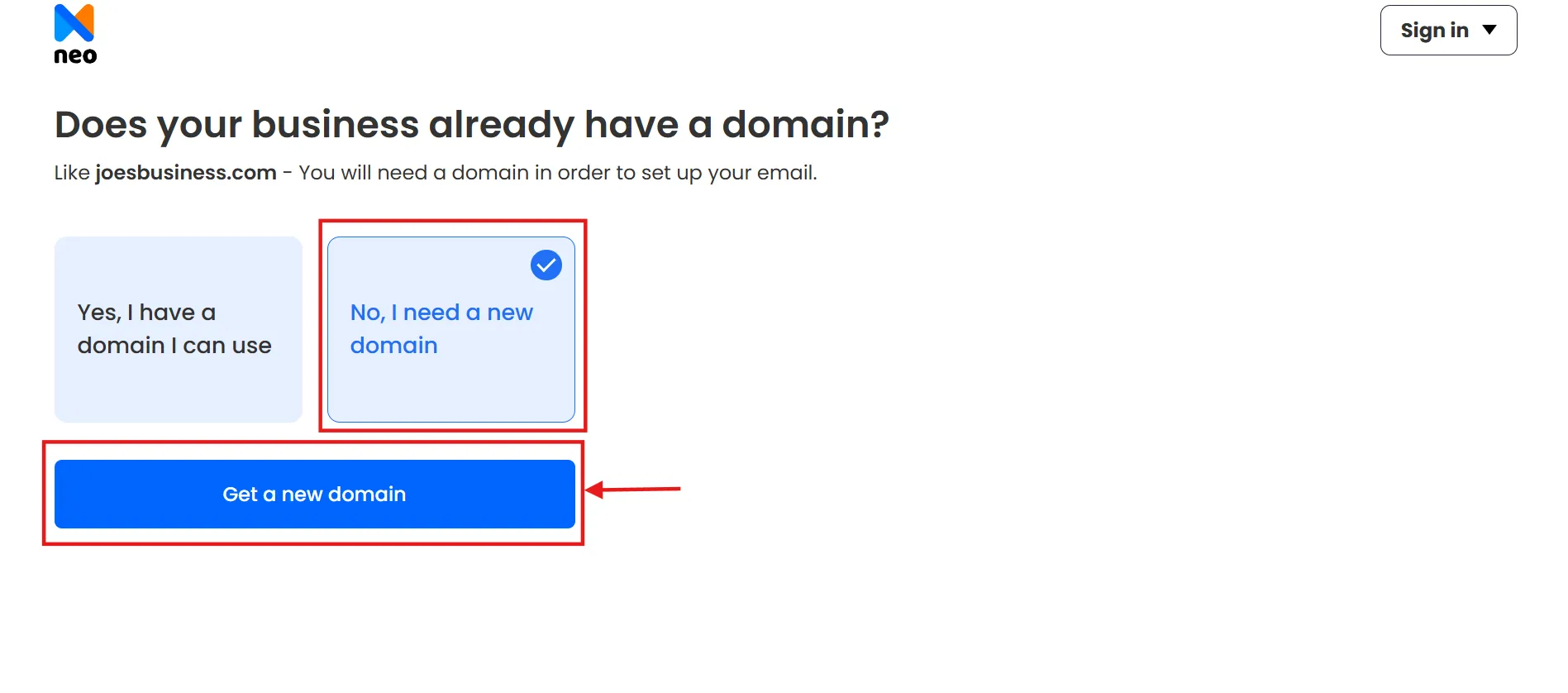
Step 3: Type in your registered domain name to verify its ownership (if you have clicked on Yes, I have a domain I can use), or simply type in the name you desire and register it with Neo (if you have clicked on No, I need a new domain).
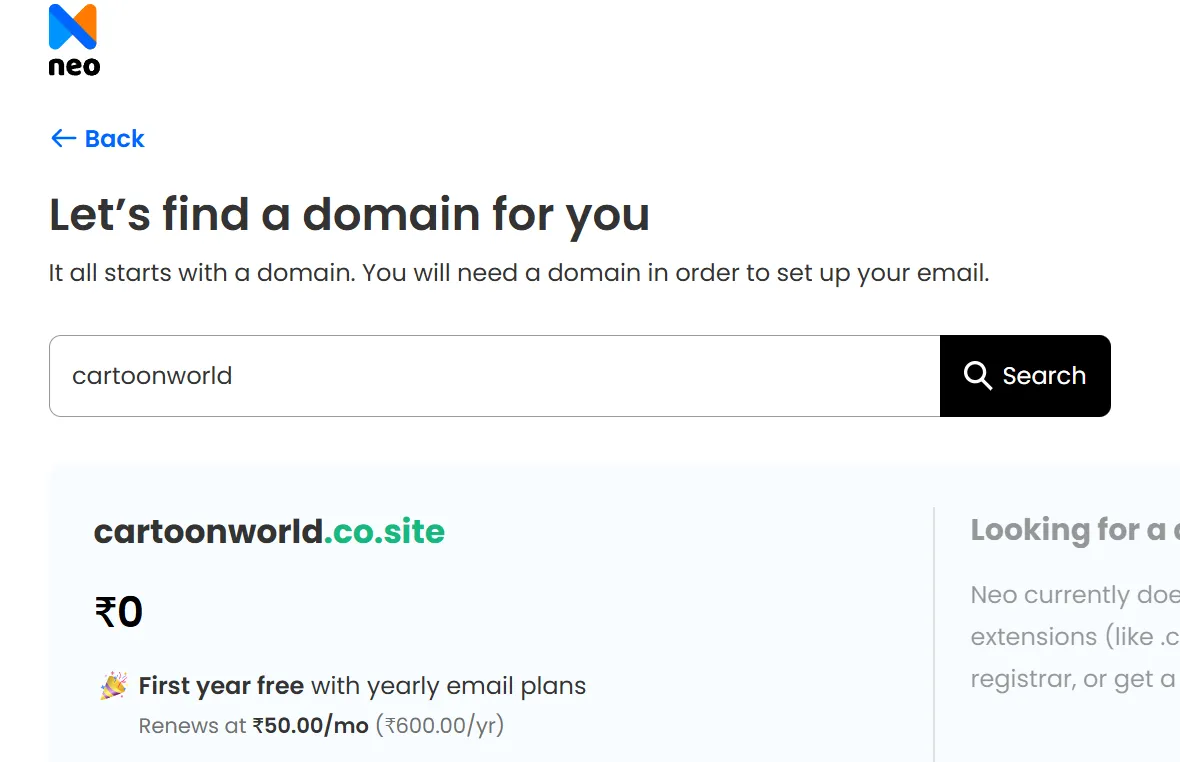
Step 4: After the domain registration is completed, you can get a 15-day free plan. The next step is to create a Neo account and select the email plan based on your needs.

Step 5: Finally, you can create a free email address for your enterprise, such as brandname@enterprisename.com or brandname@enterprisename.co.site. Remember, if you use an already registered domain, you need to update the DNS so the emails can flow through Neo’s server.
Pros
- Free domain and AI website builder, and affordable plans
- Cost-effective, suitable for small businesses and freelancers
- No technical skills or assistance needed to make a professional enterprise email account
Cons
- Focused more on small businesses than large enterprises
- Some advanced features are only available in high-tiered plans
3. Zoho Mail
Zoho Mail is a strong option for small businesses, startups, or individual founders who have an existing domain. Being a part of Zoho’s large suite, it offers a large set of features suitable for various enterprise applications.
Features
- The "Forever Free Plan" offers email hosting for one domain, with custom domain email addresses that can quickly be created for small businesses.
- Zoho Mail has integrated business apps such as Calendar, Notes, Contacts, ToDo, and bookmarks, all of which can be accessed from the inbox.
- Agile inbox management features such as filters, advanced search, out of office, and signatures.
- Seamless migration from the previous email service provider, it also provides options to migrate via IMAP/POP/Outlook Exchange.
- Offers TLS encryption, two-factor authentication, virus filtering, and is compliant with GDPR.
How to set up Zoho Mail?
To create a free small business email account with Zoho, you need an active domain (you can either use a domain you already own or buy a new one with Zoho).
Step 1: Visit the Zoho home page, click on Sign up for free.
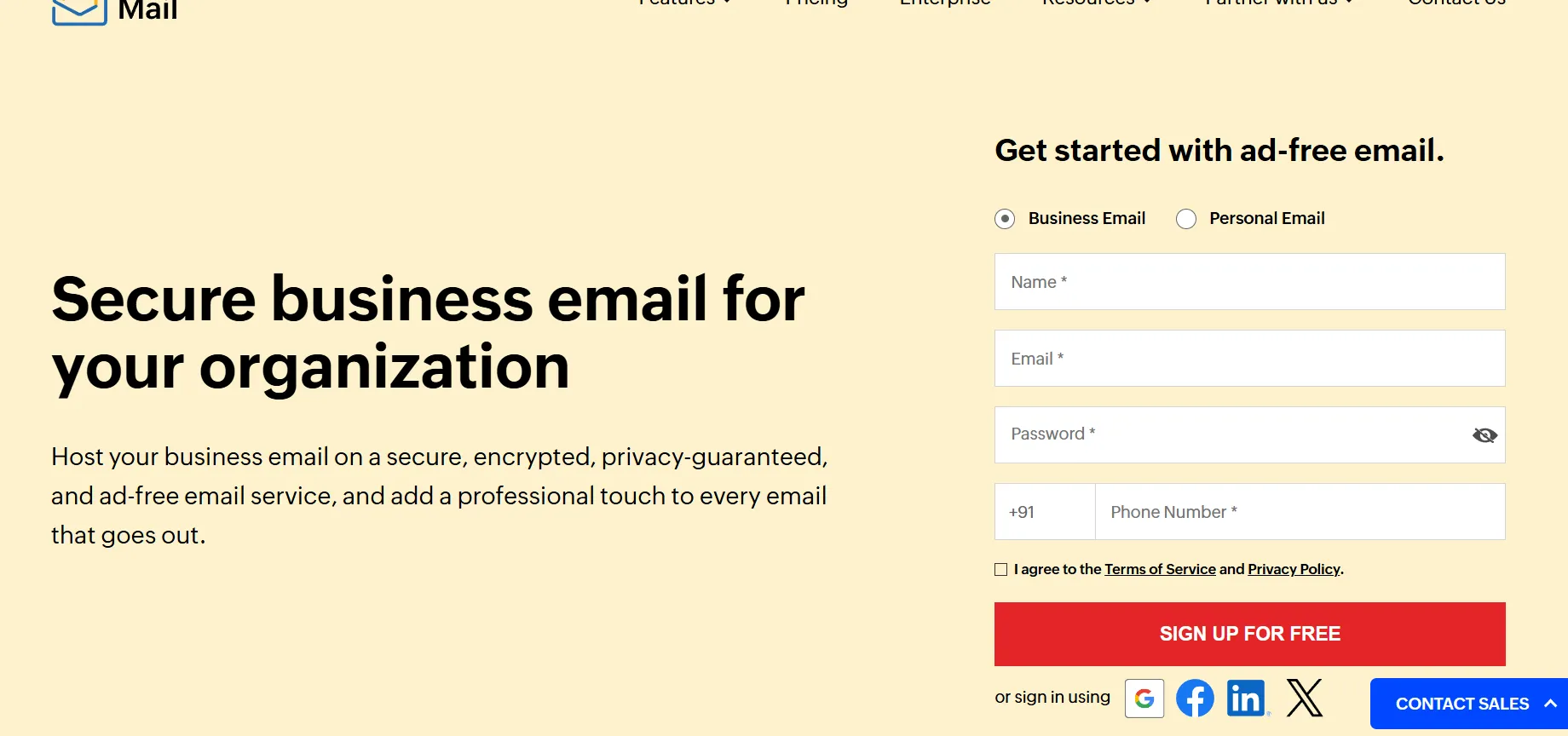
Step 2: Verify the seven-digit code that is sent to your confirmed mobile number.
Step 3: You will be asked to select the plan and click ‘Try now’ (Since you’ll want to start with the free plan).
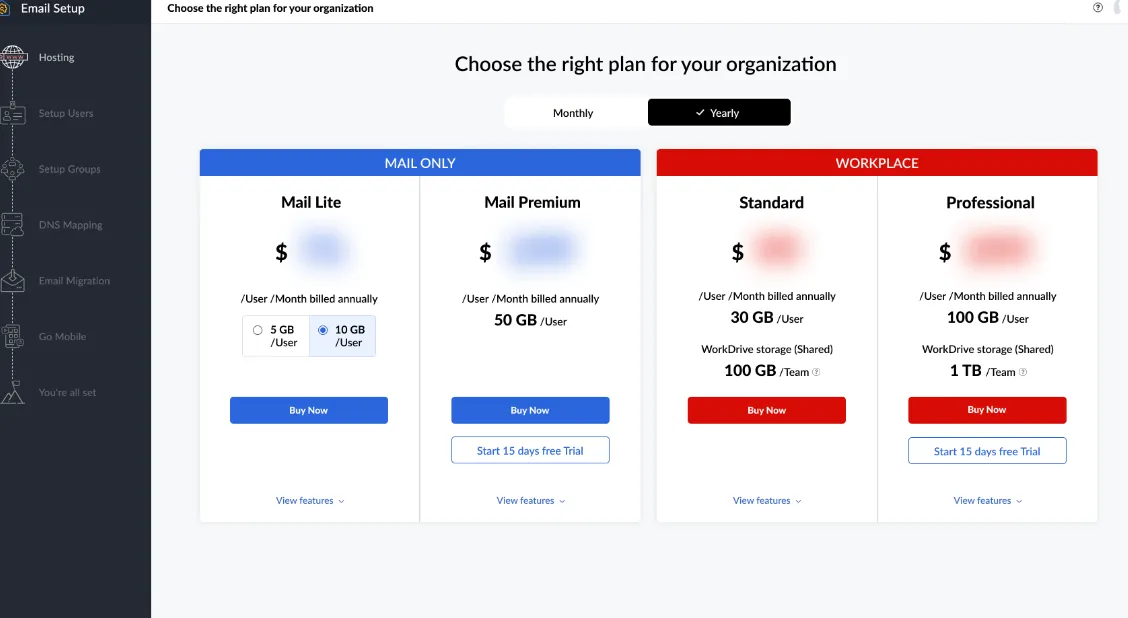
Step 4: Now select your domain. Either you can create a free email account with an existing domain, or purchase a new one.
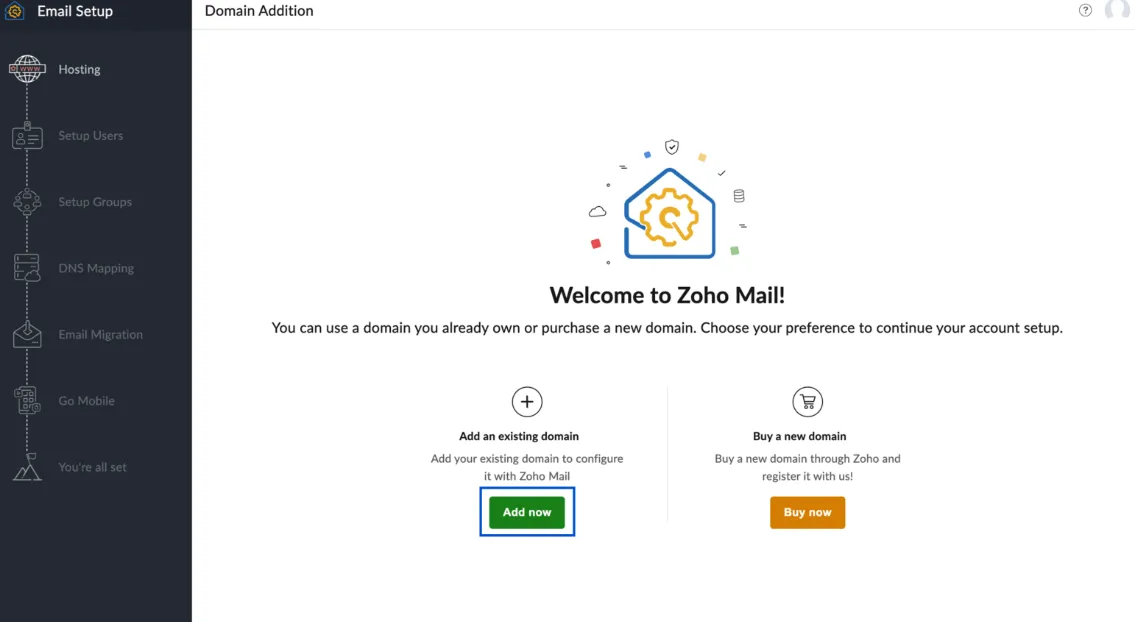
Step 5: If you want to add an existing domain, fill in the mandatory information as required and select the ‘Add now’ button. Or, if you prefer to select a new domain, you can enter the domain name you want to check for availability.
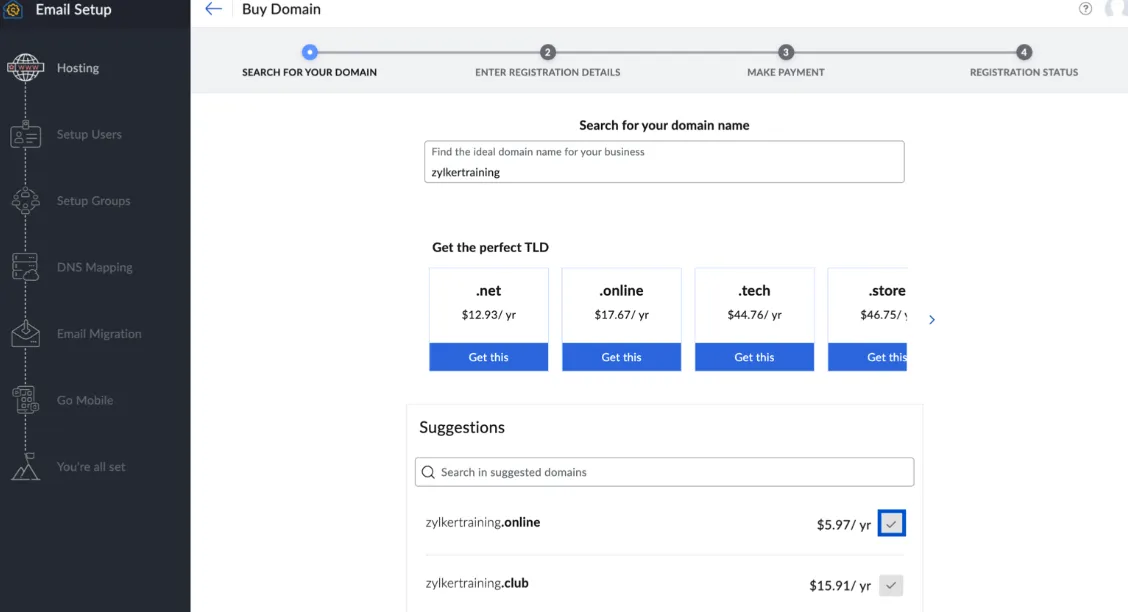
Step 7: After you have finished adding or creating the domain, you will be directed to purchase the subscription. If you select the free plan, you do not need to enter any payment information.
Step 8: Now, you will add the first user email for the account, which will be the admin email. Afterwards, you can add users individually or through a CSV file for your small business email account.
Step 9: Once the email address creation is done, set up the MX records so that emails can be received and sent via the DNS server of Zoho.
Step 10: You can also transfer all your emails via IMAP or POP protocols in case of migration to another service provider, to Zoho.
Step 11: Lastly, you must update the email deliverability settings, the SPF, and DKIM settings.
Pros
- You can reduce your costs with mix-and-match mail and workplace plans
- The free version is ad-free.
Cons
- No live support and weak third-party integrations.
- The free version comes with limited features.
4. Outlook
Outlook has fully integrated into the broader Microsoft services family (OneDrive, Office Online tools, Skype). With this, users can share files, edit documents, conduct video calls, access shared calendars, filter their inbox, and access emails on multiple devices.
Features
- You can have up to 25 users during the free one-month trial period, and add those users after the trial period has ended.
- Delivers business-grade solutions to create custom business email addresses and identity management.
- Available as a single app to manage all your email, contacts, calendar, and tasks.Offers an intelligent inbox with search enhancements and add-ins. Powerful calendaring to manage bookings and appointments.
- Advanced security features, such as multi-factor authentication, malware protection, and spam and email filtering.
- Fastrack productivity library, Exchange server deployment assistance, Exchange technical library, and guided assistance in selecting the right plan for your small business.
How to Set Up Outlook Email?
After selecting the desired Outlook plan to continue the free trial, you can begin the process of setting up an enterprise email address.
Step 1: Visit the Outlook site and click on the ‘Try for free’ button.
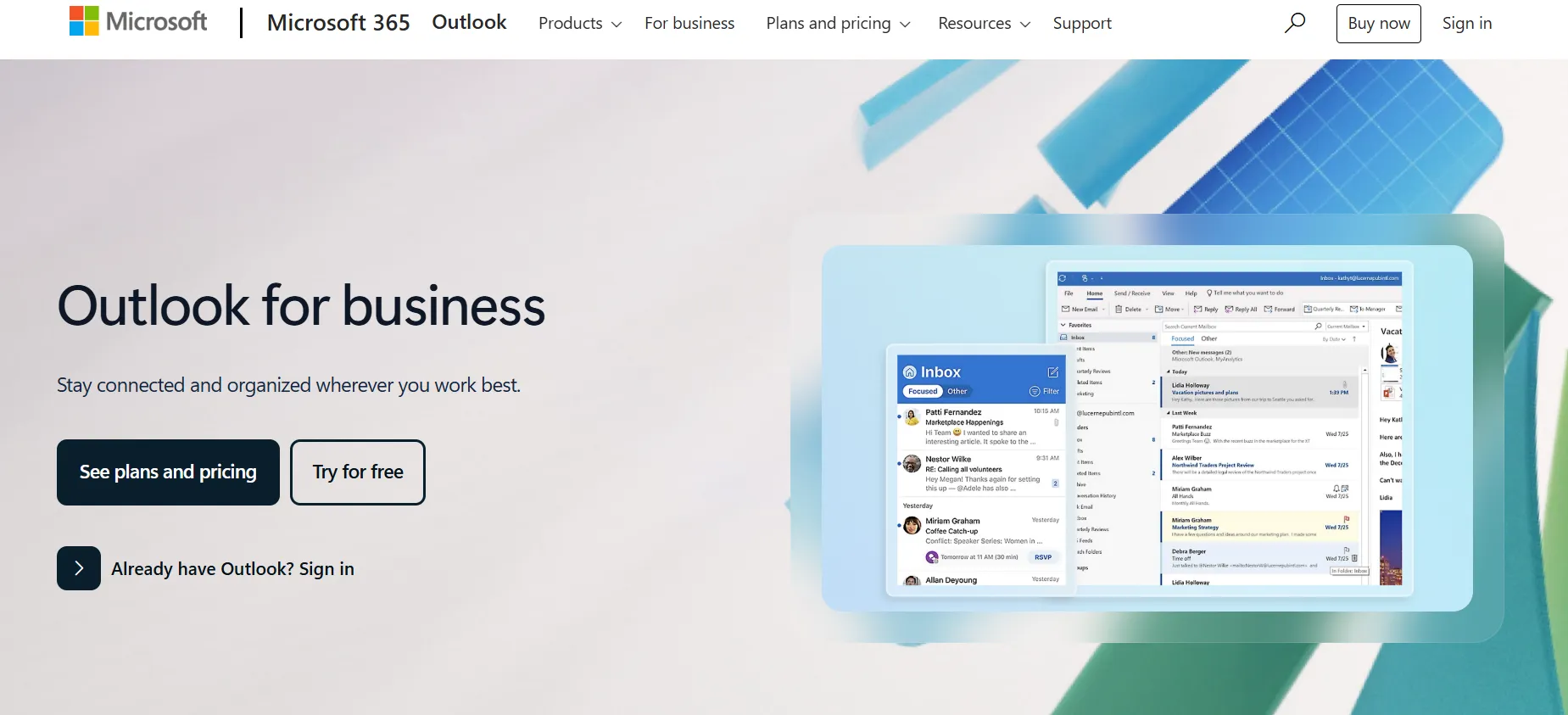
Step 2: Enter the subscription and account information to begin the 1-month free trial. The type of billing and the number of users you select will determine your plan. After creating it, just click on Next.
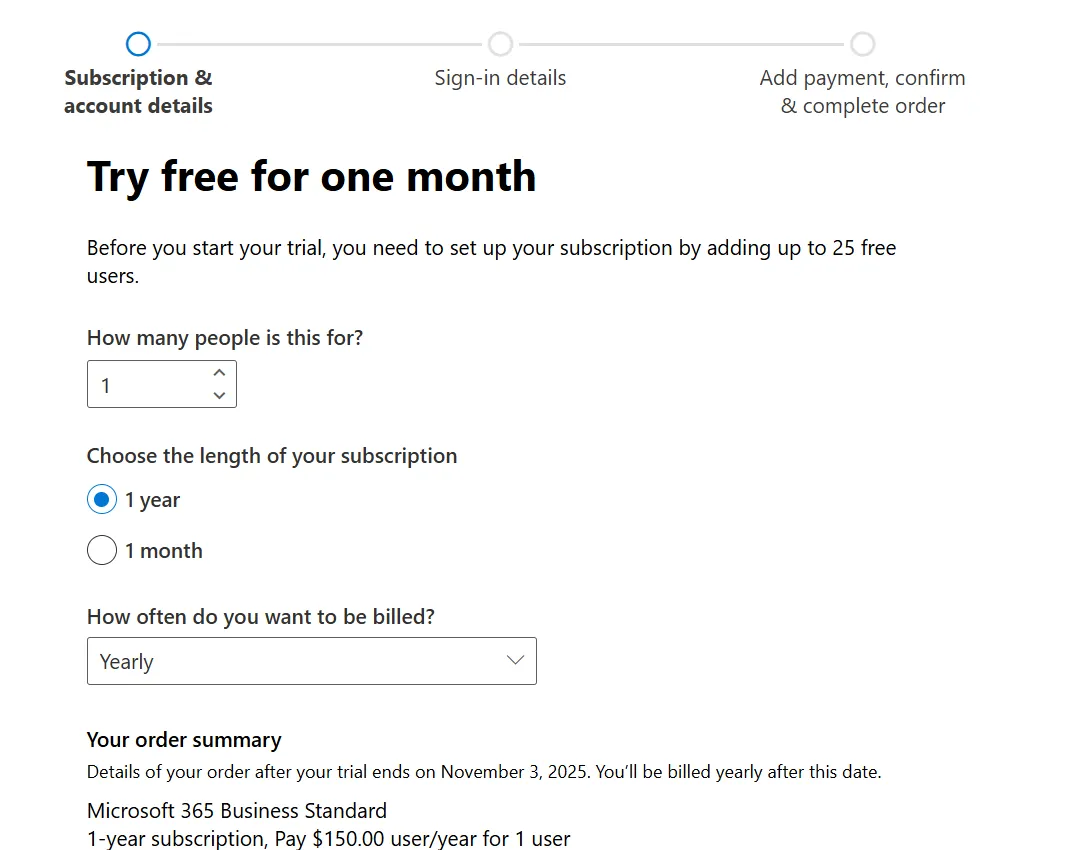
Step 3: The third step is to enter an email address that you already have. This will be checked in relation to the requirement of establishing a new account in Outlook.
Step 4: In case your account is not a match to a Microsoft account, you will be requested to create an Outlook.com email account.
Step 5: Fill in the required information to create a free email account for your enterprise. Click on ‘Next’ to proceed.
Step 6: After you finish creating your Microsoft account, head over to the Microsoft Outlook website and select “Create free account”.
Step 7: Finally, create your new Outlook email address.
Pros
- Synchronizes easily with all Microsoft tools.
- It's a familiar interface for Windows users, thus a popular platform for enterprises.
Cons
- Outlook does not offer domain-based email for free.
- Limited integrations with non-Microsoft apps.
5. Proton Mail
Proton Mail is the benchmark of safe email communication. It is based in Switzerland and provides high-security enterprise email hosting services such as end-to-end encryption, zero data tracking, and transparency in the form of open source with a privacy-first email approach..
Features
- The free version provided by Proton Mail has a storage capacity of 1 GB, and you can create a single email address, though the limit is fixed at 150 emails per day.
- Custom email domain support at the premium plan, in case you desire to utilize a custom email address.
- Add contact groups, email client support, and auto-reply, catch-all email capabilities, and unlock Dark Web Monitoring.
- Proton Calendar to improve productivity and planning.
- There is no limit to folders, labels, filters, or the number of messages.
How to set up Proton Mail?
Registering for Proton Mail is a simple process that takes a few minutes. Here’s how you can register for free:
Step 1: Visit the Proton website and click on ‘Get Proton for business”. You need a custom domain and a Proton Mail Business Plan. Create a custom domain name through any registrar and sign up for a desired Proton business plan.
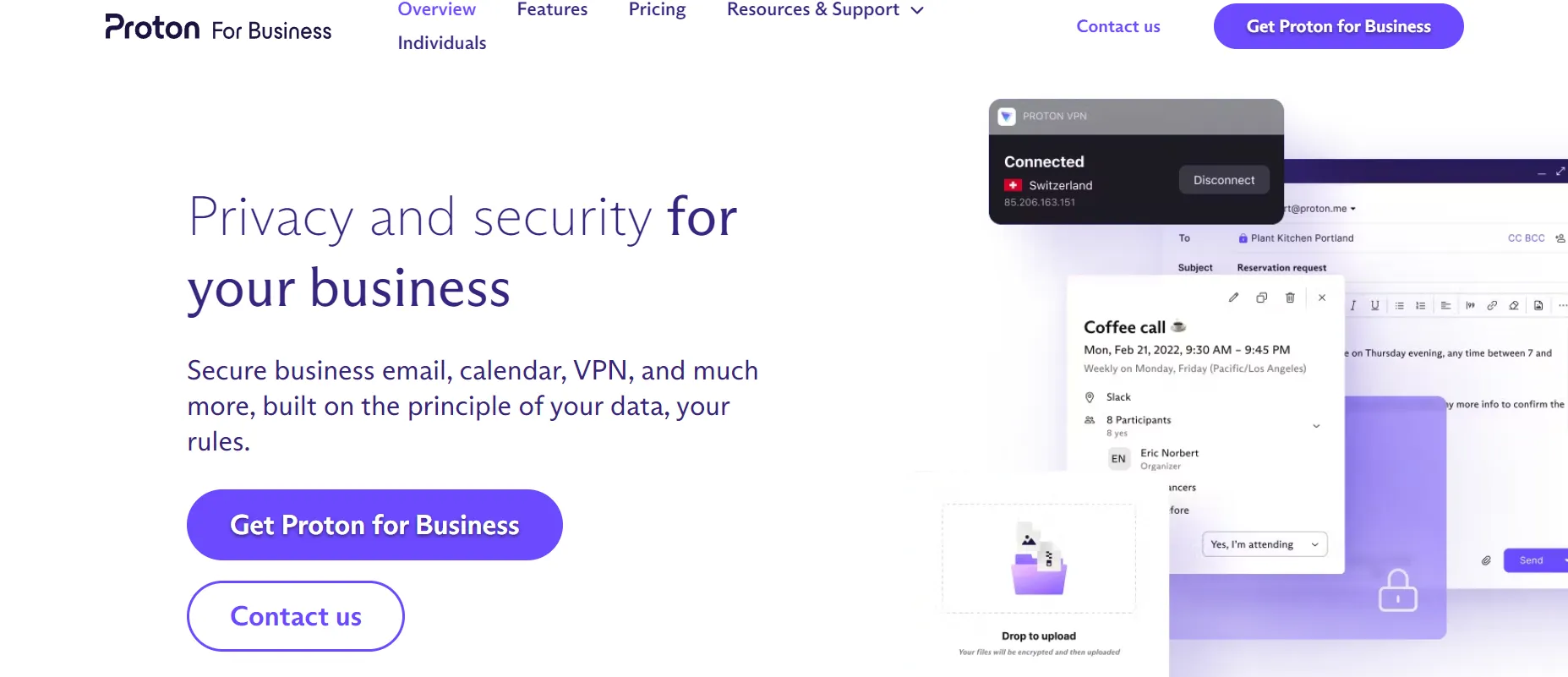
Step 2: Log in to your Proton Mail email account and go to settings to select the domain name. Select and add the domain and set up the wizard.
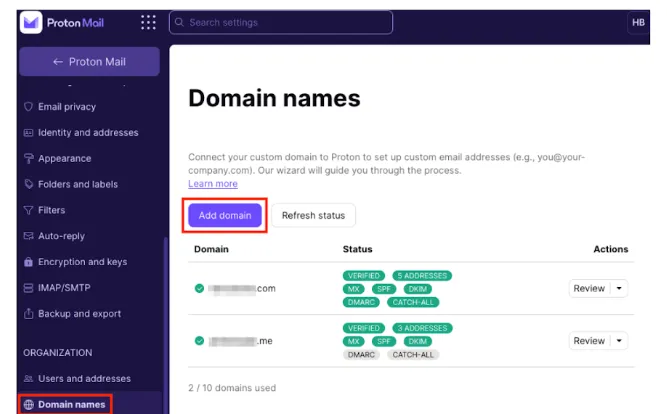
Step 3: Now, click on the ‘Multi-user’ option in the settings and enter your enterprise name, set encryption standards, and create a password. Further add storage space for your administrator account.
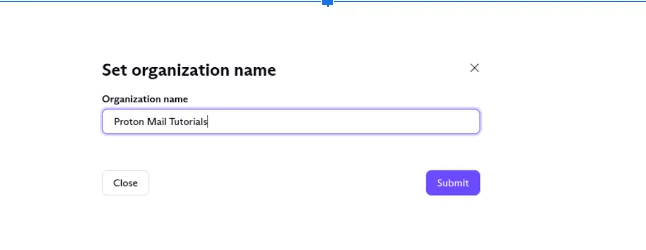
Step 4: Click on settings again, choose ‘Users and Addresses’ and select ‘Add users’ to add employee addresses.
Pros
- Tough security features and independently audited open-source applications (Web, Windows, and macOS)
- Superb cross-platform availability and multiple account recovery features.
Cons
- No inbox customization or folder styles.
- Limited free features with storage and email aliases.
6. Titan
Titan is a simple-to-set-up and easy-to-use enterprise email service provider. Especially built for small enterprises and businesses, it can assist in creating professional enterprise emails with business-oriented features at cost-effective prices.
Features
- Create a custom professional email with your existing domain. Titan works with leading registrars and hosting companies, so connecting your domain is fast and easy.
- The Titan AI Smart Write feature helps you draft emails, subject lines, and replies faster, which improves your ability to communicate in a more timely manner.
- Read Receipts are built into the platform, so you can see when your emails are opened and engage in real time.
- Titan’s Calendar and Contacts apps keep your scheduling and customer information organized and synced across web and mobile (Android & iOS).
- The platform is integrated with anti-virus, anti-spam, encryption, and anti-phishing protection.
How to set up Titan Mail?
Here’s how to create a professional business email on Titan in 3 easy steps:
Step 1: Open Titan’s website or your domain/registrar host, and click on ‘Get Started’.
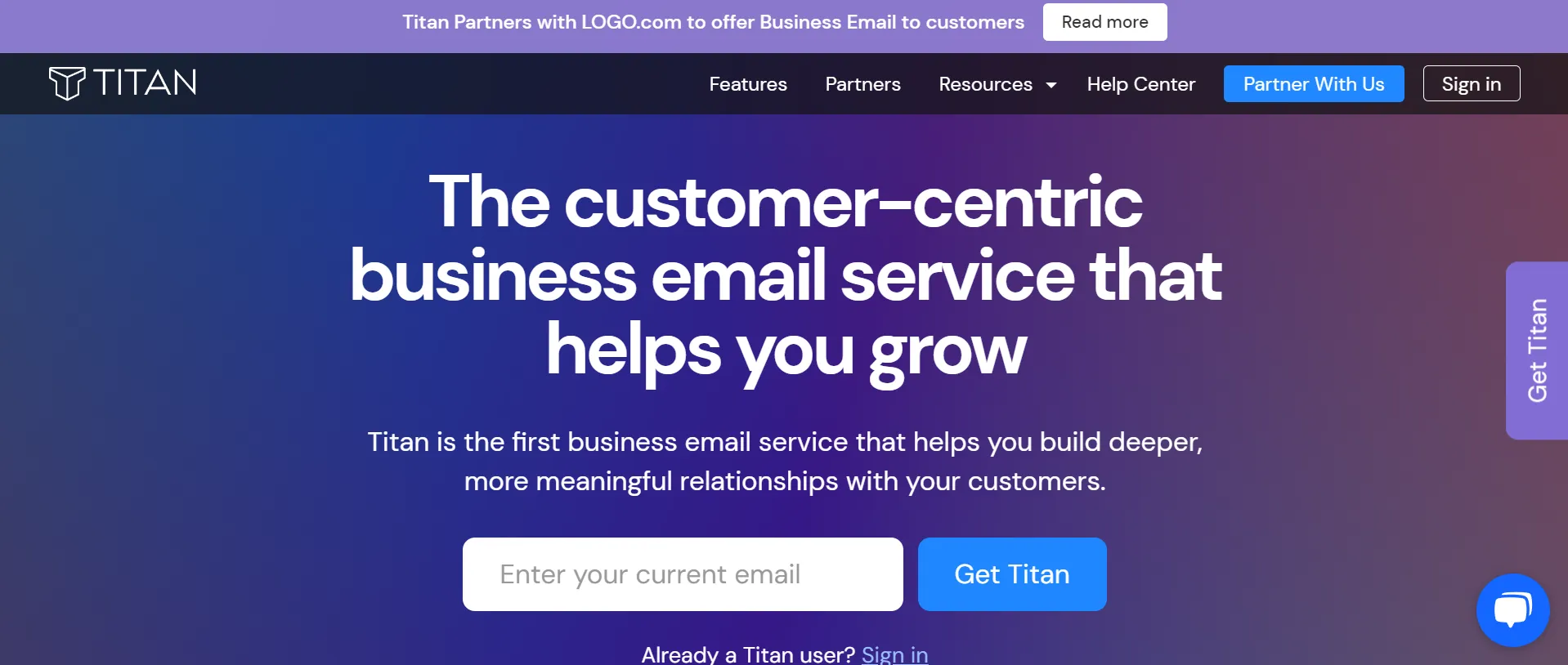
Step 2: If you have a registered domain, use it to create an enterprise email address; otherwise, purchase a new one and make the payment at the registrar’s checkout.
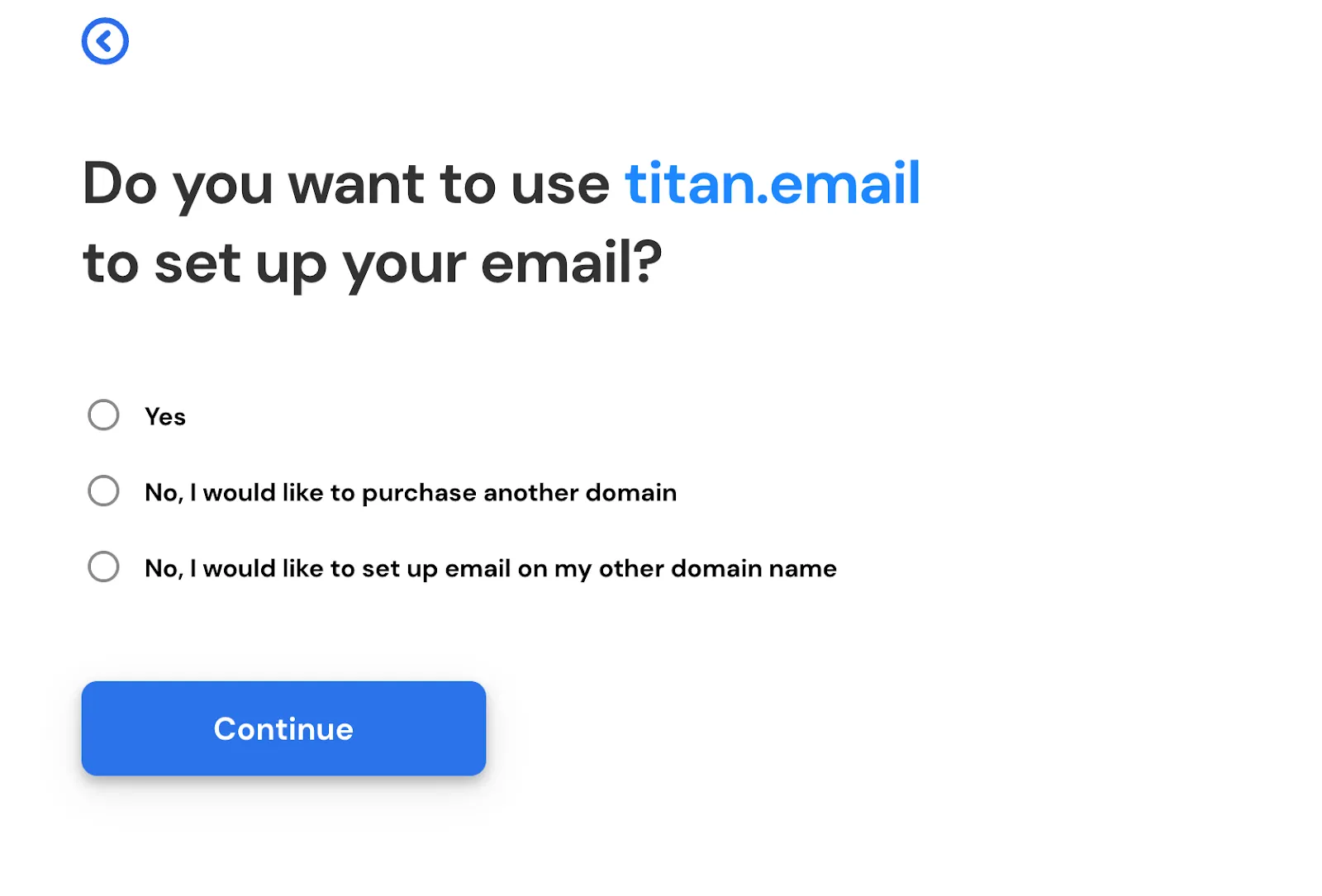
Step 3: Choose the desired Titan Mail partner, like Hostgator, NameSilo, or Name.com, to create an email. Register your desired domain name, and you can proceed to create your business email address. The friendly and intuitive user interface makes it easy to navigate the platform.
Pros
- Offers 99.9% uptime SLA with backing from top hosting providers.
- Simple onboarding and UI, easy to use for new users and small enterprises
Cons
- Does not offer a free domain.
- For enterprises requiring basic inbox functionalities, Titan might feel feature-heavy.
Features to look for in Enterprise Email Service Providers
When deciding on an enterprise email service provider, be sure to look for the following features:
- Custom domains: Enable companies to utilize personalized email addresses, helping to reinforce branding and professionalism.
- Advanced security: Email services offering encryption and spam filtering include protection of sensitive information and unauthorized access.
- Integration capabilities: This allows for connection to other existing tools, such as CRM systems and project management software, to facilitate a more efficient workflow.
- Scalability: The business can expand further with all the users and features as needed without performance degradation.
- Email scheduling: Allows users to send emails at the most effective times, thus making the flow of communication more efficient.
- Analytics tools: Keep track of the performance of the emails as well as the productivity of the team with real-time insights.
- Shared inbox management: It can allow multiple people to work together and manage and respond to emails.
- Email tracking: Monitors both delivery and opening of emails, giving you good insight into the effectiveness of communication.
- Customizable templates: Provides ready-made email designs and templates for enterprises to fast-track email communication.
- DDoS protection: Protection against cyber attacks, providing steady and dependable email service delivery.
Make the Right Choice: An Enterprise Email Service Provider That Aligns With Your Requirements
After rigorous testing of the best enterprise email service providers, your best option is to select based on your desired business needs and not simply on the basis provided by general recommendations. The decision must be based on your budget, team size, and growth plans.
So here is a quick summary to make your decision:
- Small businesses that are seeking the benefits of the free or affordable plans, as well as the advantage of the AI-powered features with good security and collaboration possibilities, should choose Neo.
- Titan and Proton Mail are best suited to SMBs that seek advanced security features with regard to privacy, data encryption and compliance.
- Google Workspace and Outlook can be ideal for enterprises that desire uninterrupted scalability, collaboration and all-in-one productivity tools for growing teams.
- Zoho Mail is also a perfect choice if you already work in Zoho’s ecosystem and seek cheaper options to increase the online presence of your business.
The Bottom Line
At the end of the day, the enterprise email service you choose should grow with you and should not restrict you from expanding your horizons. Hence, you should consider your future requirements along with present needs, and then choose a platform that satisfies all of them.
For instance, if you are a small business and want to build a digital presence, then you need an enterprise email platform, which builds your brand identity, streamlines communication, and supports email campaigns (in the future). All of this at cost-effective rates because you can allocate a massive portion of your budget in subscribing to email hosting.
In such a case, Neo is a suitable option. It provides free domain name registration, has all the major features for email communication, management, and marketing. Plus, you can even deploy your website without any extra expense.
So, approach it with this perspective and choose the enterprise email service that best fits your business.
FAQs
1. What is the best email provider for a business?
For a business, especially small or the ones that just started, Neo is the best email provider as it provides free domain name registration with its email plans. For medium-sized businesses and enterprises, Google Workspace, Outlook, and Zoho Mail are recommended email service providers.
2. How do I get an enterprise email address?
To get an enterprise email address, you need to first register your domain name with a registrar. Then, choose a suitable email hosting provider and select a plan. You can then continue to create your enterprise email address.
3. What is an enterprise email account?
An enterprise email account is an email account with a customized, professional email address. Like, joedoe@stitchingdreams.co.site or info@stitchingdreams.co.site is an enterprise email account as it reflects that the email address is used for business purposes.
4. What is an email service provider esp?
An email service provider is a platform that offers email hosting resources to facilitate email communication and send, manage, and create email campaigns. You can either purchase email server software, like Microsoft Exchange Server and Postfix or rent email servers from email hosting providers like Neo, Google and Zoho, and they manage the technicalities for you.
5. What is the top enterprise email hosting solution in 2025 among small enterprises?
With affordable plans, quick setup, and advanced AI-driven features, and free domains, Neo is one of the best email hosting service providers for small enterprises in 2025.
6. Can we use the existing domain for professional email hosting services?
Yes, many prominent email hosting platforms on the list, such as Google Workspace, Neo, Outlook, and Zoho Mail, allow you to use your own professional domain for email hosting services.
7. How much does an enterprise email service cost on average?
Prices are different according to features, team size, and other services. Most of the providers will come with tiered pricing plans, and you can select the one that suits your budget.
8. What features improve team productivity in enterprise email
Enterprise-grade email isn’t just about sending and receiving messages. It’s about how efficiently your team collaborates, communicates, and stays organized.
Here’s how Neo enhances productivity across teams:
- Shared inboxes and labels help manage team accounts like sales@ or support@ without overlap.
- Smart filters and priority sorting automatically organize messages so you focus on what matters most.
- Integrated calendar and meeting scheduling reduce back-and-forth emails.
- Mobile-first access keeps your team connected on the go.
- AI-assisted replies and smart compose save time on repetitive communication.
- Website + domain + email in one suite ensures all your digital tools are connected and managed together.
Pro tip: Encourage teams to create rules and templates for repetitive workflows — Neo lets admins set these up once and apply them company-wide.
9. How to set up email on a custom domain for my company
Getting a professional business email with your own domain instantly elevates your brand. Here’s how to do it with Neo:
- Choose your domainfree custom domain for one year (like yourbusiness.co.site).
- Create your email addresses – Set up addresses like info@, sales@, or yourname@yourdomain.
- Set up DNS records – Neo provides ready-to-add MX, SPF, DKIM, and DMARC entries to ensure deliverability.
- Access your inbox – Use Neo’s clean web interface or connect to any mail client.
- Add your team – Invite up to 100 users, assign roles, and manage everything from one dashboard.
- Secure your account – Turn on MFA and configure spam protection right inside Neo.
10. Which provider offers the best security and compliance for enterprises
When choosing an enterprise email provider, the most important factors are encryption, data protection, identity management, and regulatory compliance. Leading platforms today, including Microsoft 365, Google Workspace, and Neo, all offer robust security frameworks designed to protect business communication at scale.
Microsoft 365 provides deep compliance coverage across global standards such as GDPR, ISO 27001, and HIPAA. It includes data loss prevention (DLP), audit logging, and advanced threat protection that integrates directly with Azure Active Directory for secure access management.
Google Workspace focuses heavily on zero-trust security and endpoint management. With features like client-side encryption, context-aware access, and secure collaboration controls, Google ensures that sensitive business data remains protected across its ecosystem.
Neo, while designed for growing businesses, brings enterprise-grade protection to smaller teams. It includes end-to-end encryption, multi-factor authentication (MFA), and spam and phishing filters by default. Admins can set user-level permissions, monitor login activity, and configure retention policies to maintain control and compliance.
Each of these providers meets the core requirements for enterprise security, but the right choice depends on your organization’s size, industry, and compliance obligations. Large enterprises often prioritize Microsoft or Google for their ecosystem integrations, while growing businesses may find Neo’s streamlined setup and built-in protection more practical for everyday operations.

Get Business Email
No domain name required
Looking for Enterprise Email?
Try Neo!





.svg%201.svg)
.svg)
.svg)
.svg%201.svg)



